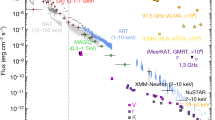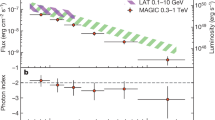Abstract
In the 12 yr since the discovery of γ-ray bursts by Klebesadel et al.1, several hundred of these enigmatic events have been observed and catalogued (see, for example, refs 2–5). Their time histories have exhibited a tremendous diversity: they can have durations of milliseconds or minutes; they may contain one or a dozen individual peaks; and they can be highly impulsive or slowly varying. Possibly the only truly unifying observational property of γ-ray bursts is that, with very few exceptions6,7, the bulk of the energy output seems to be in the form of γ-rays. Here we report the detection on 15 December 1984 at 08.25 UT of an extraordinary outburst, qualitatively different in appearance from all previously observed γ-ray bursts. It is described most conveniently as a ‘classical’ multi-peaked, hard-spectrum burst that has been compressed in time by a factor of 10–100 while simultaneously having its intensity increased by a like factor (thus conserving fluence). Its peak intensity was much higher than any other known γ-ray burst except for GB790305b, which had an unusually soft spectrum and other unique features that set it apart from ‘classical’ γ-ray bursts8. However, a key point is that if the intensity of GB841215 had been ‘normal’, its narrow individual spikes would not have been statistically significant with current instrumentation, and the event would have had the appearance of a rather ordinary, short γ-ray burst.
This is a preview of subscription content, access via your institution
Access options
Subscribe to this journal
Receive 51 print issues and online access
$199.00 per year
only $3.90 per issue
Buy this article
- Purchase on Springer Link
- Instant access to full article PDF
Prices may be subject to local taxes which are calculated during checkout
Similar content being viewed by others
References
Klebesadel, R. W., Strong, I. B. & Olson, R. A. Astrophys. J. Lett. 182, L85–L88 (1973).
Mazets, E. P. et al. Astrophys. Space Sci. 80, 3–143 (1981).
Klebesadel, R. W. et al. Astrophys. J. Lett. 259, L51–L56 (1982).
Baity, W. A., Hueter, G. J. & Lingenfelter, R. E. AIP Conf. Proc. No. 115, 434–484 (1984).
Atteia, J.-L. et al. Astrophys. J. Suppl. (in the press).
Mazets, E. P., Golenetskii, S. V., Guryan Yu., A. & Ilyinski, V. N. Astrophys. Space Sci. 84, 173–189 (1982).
Laros, J. G., Fenimore, E. E., Klebesadel, R. W. & Kane, S. R. Bull. Am. astr. Soc. 17, 520–521 (1985).
Cline, T. L. et al. Astrophys. J. Lett. 237, L1–L6 (1980).
Klebesadel, R. W. et al. IEEE Trans. Geosci. Rem. Sens. GE-18, 76–80 (1980).
Anderson, K. A. et al. IEEE Trans. Geosci. Elect. GE-16, 157–159 (1978).
Turner, M. J. L., Smith, A. & Zimmerman, H. U. Space Sci. Rev. 30, 513–524 (1981).
Author information
Authors and Affiliations
Rights and permissions
About this article
Cite this article
Laros, J., Fenimore, E., Fikani, M. et al. GB841215, the fastest γ-ray burst?. Nature 318, 448–449 (1985). https://doi.org/10.1038/318448a0
Received:
Accepted:
Issue Date:
DOI: https://doi.org/10.1038/318448a0
This article is cited by
-
Short Gamma-Ray Bursts observed by PHEBUS
Astrophysics and Space Science (1995)
-
Evidence for sub-millisecond structure in a γ-ray burst
Nature (1992)
-
Re-ignition of dead pulsars by passages of interstellar comets through the magnetosphere: Possible nature of cosmic gamma-ray bursts
Astrophysics and Space Science (1990)
Comments
By submitting a comment you agree to abide by our Terms and Community Guidelines. If you find something abusive or that does not comply with our terms or guidelines please flag it as inappropriate.



